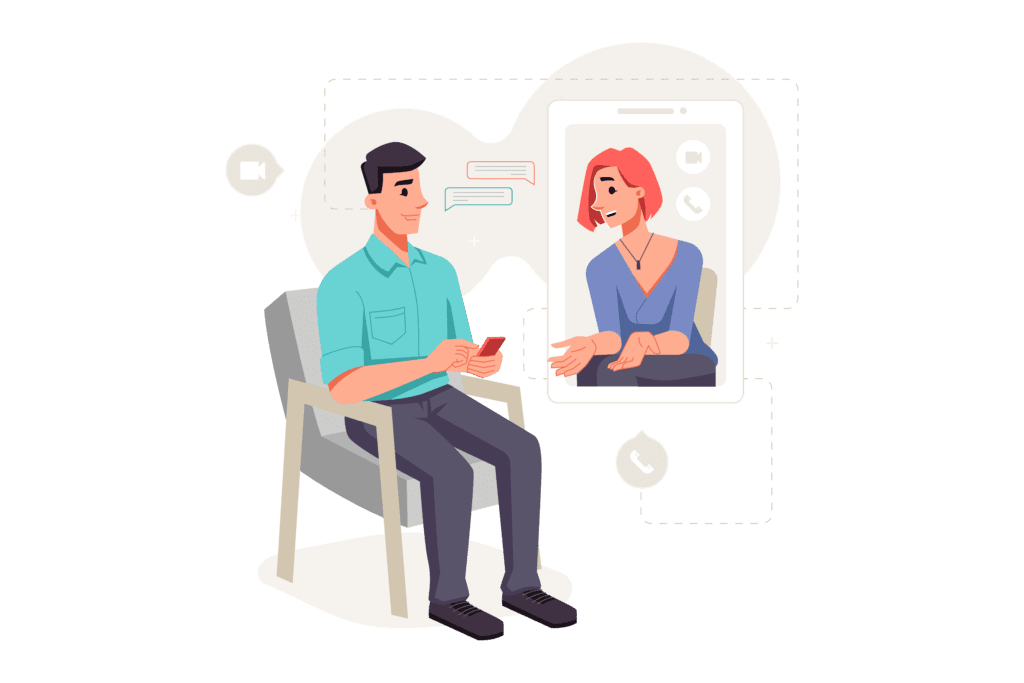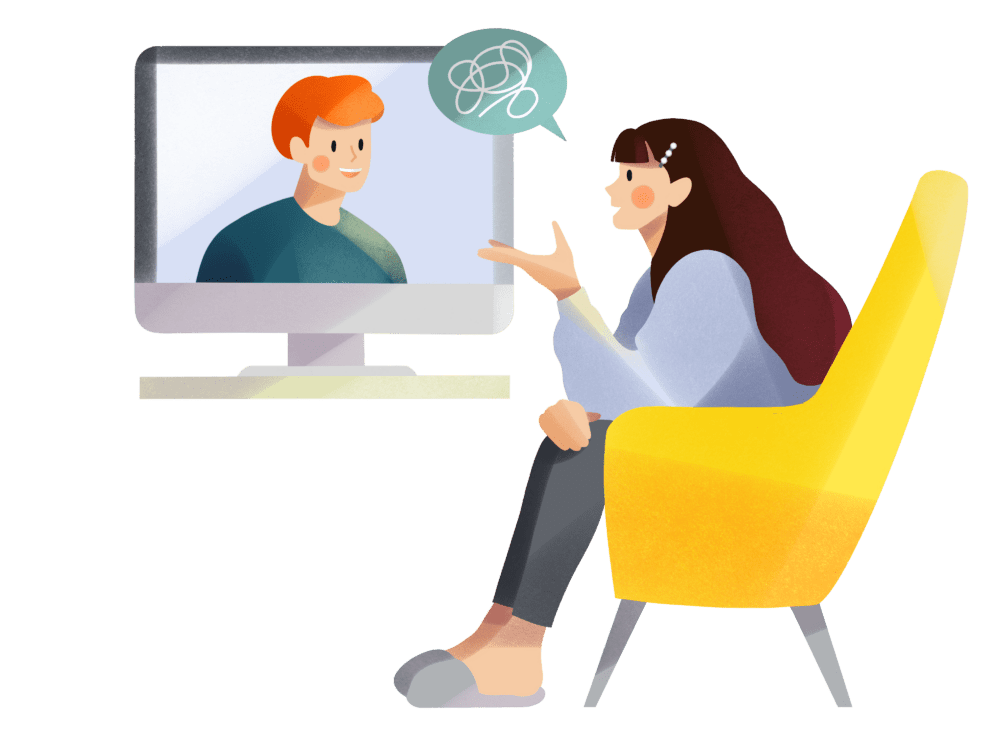Nowadays, where everything from shopping to banking is done online, it’s no surprise that therapy has also moved into the digital realm. Online therapy has become an increasingly popular option for people seeking mental health support, offering a convenient and accessible way to talk to a therapist without the need for a traditional office visit. But does online therapy really work? Let’s explore how online therapy compares to in-person therapy, its benefits, challenges, and what studies say about its effectiveness.
What is Online Therapy?
Online therapy, sometimes referred to as teletherapy or e-therapy, involves receiving mental health services through the internet. This can be done through various platforms, such as video calls, phone calls, chat rooms, or email. At Oceanos Therapy, we specialize in providing personalized online therapy sessions that cater to your unique needs and preferences, connecting clients with licensed therapist who offer a range of services, from regular talk therapy to more specialized approaches like cognitive-behavioral therapy (CBT) or mindfulness-based techniques.
The Benefits of Online Therapy
Online therapy comes with several key benefits that make it appealing to many people:
1. Convenience and Accessibility
- Location: You can access therapy from anywhere with an internet connection, whether you’re at home, in the office, or traveling. This is particularly beneficial for those who live in rural areas with limited access to mental health services.
- Time: Online therapy eliminates the need to commute to a therapist’s office, saving time and making it easier to fit sessions into a busy schedule.
2. Affordability
- Online therapy is often more affordable than traditional in-person therapy. Many platforms, including Oceanos Therapy, offer affordable models that allow for a set number of sessions per month at a lower cost than traditional therapy.
- Some insurance companies are starting to cover online therapy, making it even more accessible.
3. Anonymity and Comfort
- For those who feel anxious about meeting face-to-face, online therapy can provide a sense of comfort and anonymity. Being in a familiar environment can help individuals open up more easily.
- Some platforms allow users to remain anonymous, using a nickname instead of their real name, which can help people who are hesitant to seek help due to stigma or personal concerns.
The Challenges of Online Therapy
While online therapy offers many benefits, there are also challenges to consider:
1. Technical Issues
- Connectivity: A stable internet connection is essential for effective communication. Technical issues can disrupt sessions and make it challenging to have a productive conversation.
- Tech Savviness: Not everyone is comfortable using technology, which might make online therapy feel intimidating or inaccessible for some.
2. Limited Non-Verbal Cues
- Body language and other non-verbal cues play a significant role in therapy. While video calls can capture some of these cues, they are not as clear as in-person interactions.
- Text-based therapy may miss important non-verbal signals altogether, potentially affecting the therapist’s ability to fully understand the client’s emotions.
3. Not Suitable for All Conditions
- Online therapy might not be the best choice for everyone, especially those with severe mental health conditions or crises that require immediate, in-person intervention.
- Some types of therapy, such as exposure therapy for phobias, may be less effective when conducted online.
What Does the Research Say?
Research on the effectiveness of online therapy has been promising, showing that it can be just as effective as traditional in-person therapy for many conditions, particularly when it comes to treating anxiety and depression. Here are some key findings:
- Cognitive-Behavioral Therapy (CBT): Several studies have shown that online CBT is as effective as in-person CBT for treating anxiety and depression. One study published in the Journal of Anxiety Disorders found that participants who received online CBT showed significant improvements in symptoms comparable to those who had face-to-face therapy sessions 111.
- Anxiety and Depression: A 2020 meta-analysis published in Psychological Bulletin found that online therapy had a large positive effect on reducing symptoms of anxiety and depression, with outcomes similar to traditional therapy 222.
- User Satisfaction: Many users report high satisfaction rates with online therapy. A survey by the American Psychological Association found that 76% of users said they were pleased with their online therapy experience, citing convenience and accessibility as key factors 333.

Tips for Making the Most of Online Therapy
If you’re considering online therapy, here are some tips to ensure you get the most out of your sessions:
- Find a Licensed Therapist: Make sure the therapist you choose is licensed and has experience in the area you need help with. At Oceanos Therapy, you can find the qualifications through this link.
- Set Up a Comfortable Space: Choose a quiet, private space for your sessions where you feel comfortable speaking openly. Good lighting and a stable internet connection can help minimize distractions and technical issues.
- Be Open and Honest: As with any therapy, being open and honest with your therapist is crucial. Share your thoughts, feelings, and concerns freely to get the best possible support.
- Give it Time: Therapy is a process, whether online or in-person. Be patient with yourself and give the therapy time to work. It might take a few sessions before you start noticing significant changes.
Oceanos Therapy: Your Partner in Online Mental Health Care
At Oceanos Therapy, we understand the importance of mental health and strive to provide effective, accessible, and personalized online therapy services. Our licensed therapist is dedicated to helping you navigate your mental health journey, offering support for various issues such as anxiety, depression, stress management, relationship concerns, and more.
Why Choose Oceanos Therapy?
- Experienced Therapist: Our therapist is not only licensed but also have extensive experience in their fields, ensuring you receive high-quality care tailored to your needs.
- Flexible Scheduling: We offer flexible scheduling options to accommodate your busy lifestyle, making it easy to fit therapy sessions into your day. You can book your session directly from our interactive calendar through this link
- Customized Approach: At Oceanos Therapy, we believe that one size does not fit all. Our therapists work closely with you to develop a personalized treatment plan that aligns with your goals and preferences.
- Secure and Confidential: Your privacy is our priority. We use secure platforms to ensure your personal information and therapy sessions remain confidential. See our privacy policy and therapy contract.
Conclusion
Online therapy has emerged as a powerful tool for delivering mental health support in our increasingly digital world. While it may not be suitable for everyone or every situation, its benefits in terms of convenience, accessibility, and affordability make it an appealing option for many. Research indicates that online therapy can be just as effective as traditional therapy for a variety of conditions, making it a viable alternative for those seeking mental health care.
If you’re considering online therapy, weigh the pros and cons, research different platforms, and find a licensed therapist who meets your needs. At Oceanos Therapy, we are committed to providing compassionate and effective support tailored to your unique journey. Check out our services through this link for more information. Whether you choose online or in-person therapy, the most important step is seeking help and prioritizing your mental health. Remember, reaching out for support is a brave and significant step towards well-being.
Get Started with Oceanos Therapy Today
Ready to take the next step in your mental health journey? Visit Oceanos Therapy to learn more about our online therapy services and schedule your first session. Our team is here to support you every step of the way.
References
- Andersson, G., & Cuijpers, P. (2009). Internet-based and other computerized psychological treatments for adult depression: A meta-analysis. Cognitive Behaviour Therapy, 38(4), 196–205. https://doi.org/10.1080/16506070903318960
- Barak, A., Hen, L., Boniel-Nissim, M., & Shapira, N. (2008). A comprehensive review and a meta-analysis of the effectiveness of internet-based psychotherapeutic interventions. Journal of Technology in Human Services, 26(2-4), 109–160. https://doi.org/10.1080/15228830802094429
- Perle, J. G., Langsam, L. C., & Nierenberg, B. (2011). Controversy clarified: An updated review of clinical psychology and telehealth. Clinical Psychology Review, 31(8), 1247–1258. https://pubmed.ncbi.nlm.nih.gov/21963670/
Ready to begin? Start your online therapy journey today. Book your first session now.




